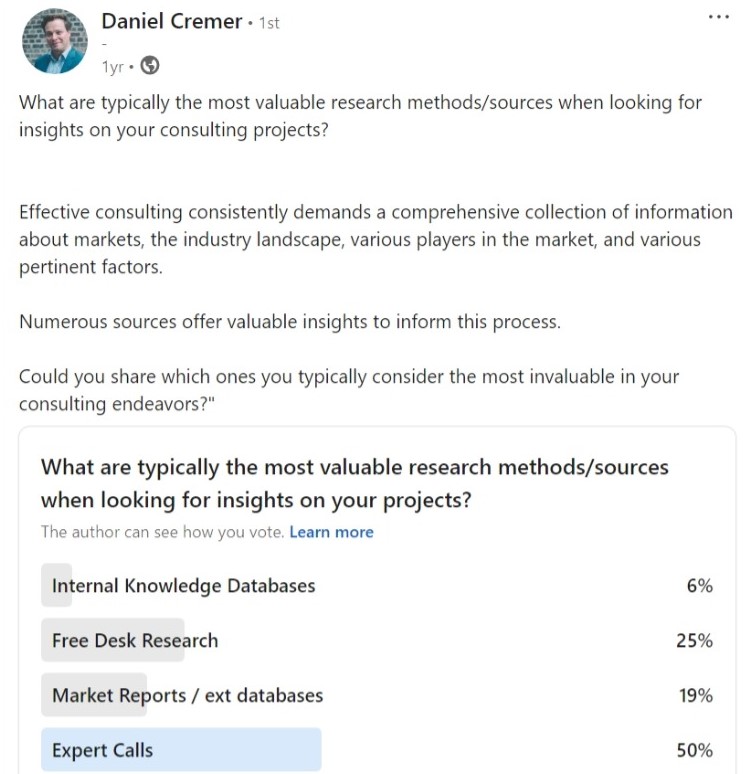Unlocking Valuable Insights for Consulting Projects: What Research Methods Work Best?
Successful consulting projects rely heavily on access to high-quality information. Whether it's understanding market dynamics, analyzing competitors, or exploring industry trends, the foundation of any solid consulting recommendation is built on thorough research. But with a plethora of sources available, which ones provide the most valuable insights?
Daniel Cremer
11/6/20242 min read


My recent poll aimed to answer this question, gathering input from consulting professionals on their preferred research methods. The results were telling:
6% rely on internal knowledge databases
25% utilize free desk research
19% favor market reports and external databases
50% find expert calls the most valuable resource
Let’s take a closer look at each of these methods and why they matter in the consulting world.
1. Expert Calls: The Power of First-Hand Knowledge (50%)
It’s no surprise that expert calls ranked as the most valuable research method. Speaking directly with industry insiders offers unique, first-hand insights that simply cannot be found in reports or databases. Key benefits include:
Real-time market intelligence: Experts provide current and nuanced information that isn't always reflected in published reports.
Contextual understanding: Unlike generic data, expert insights often include strategic perspectives, operational challenges, and evolving industry trends.
Customization: Consultants can tailor conversations to their specific project needs, getting answers to niche questions.
Expert calls help validate hypotheses, challenge assumptions, and provide a reality check on data-driven insights. For consulting firms that prioritize accuracy and speed, leveraging expert networks is an invaluable strategy.
2. Free Desk Research: Cost-Effective but Time-Intensive (25%)
A significant portion of consultants still rely on publicly available information from sources such as industry websites, government publications, financial filings, and news articles. Free desk research has its advantages:
Cost savings: No subscription fees or expensive reports are required.
Breadth of information: A vast amount of data can be sourced from different platforms.
Initial hypothesis building: It helps frame early-stage research and identify key trends.
However, the major drawback is time consumption and the challenge of filtering through large amounts of often conflicting or outdated data. While it's a great starting point, free research alone might not provide the depth needed for strategic recommendations.
3. Market Reports and External Databases: Comprehensive but Costly (19%)
Market intelligence reports and subscription-based databases such as Gartner, Statista, and IBISWorld are commonly used in consulting projects. These sources offer:
Comprehensive industry data: Covering trends, forecasts, and competitive landscapes.
Credibility: Published by established research firms with rigorous methodologies.
Benchmarking: Helpful for comparing company performance with industry peers.
Despite their value, these reports can be expensive and may not always reflect the most up-to-date market shifts. Additionally, they often lack the granularity needed for specialized consulting cases.
4. Internal Knowledge Databases: Leveraging Past Work (6%)
A smaller percentage of consultants tap into internal knowledge databases, which store insights from previous projects, client engagements, and industry research. These repositories provide:
Institutional knowledge: A rich history of past experiences and client interactions.
Efficiency: Avoiding redundant work by leveraging existing insights.
Cross-project learning: Identifying patterns and best practices across different engagements.
While highly useful for firms with established knowledge management systems, smaller consultancies may lack the structure to fully capitalize on this method.
Choosing the Right Mix of Research Methods
The poll results highlight that no single approach is universally sufficient. A hybrid research strategy—combining expert insights, published reports, and in-depth desk research—often yields the most reliable results. Consultants must balance cost, accuracy, and timeliness to achieve the best outcomes for their clients.
For instance, combining:
Expert calls for strategic depth and contextual understanding.
Market reports for comprehensive data and trend analysis.
Desk research for additional background and validation.
Internal knowledge for leveraging institutional insights.
This blended approach ensures a well-rounded, data-driven consulting process.
Conclusion: Insights Are the Key to Impactful Consulting
Gathering the right insights is a crucial step in delivering impactful consulting recommendations. While expert calls seem to offer the highest value according to the poll, successful consulting firms often leverage multiple research sources to provide a 360-degree view of the market landscape.
#Consulting #Strategy #MarketResearch #ExpertCalls #IndustryInsights #BusinessGrowth
Connect
Partnering with you for exceptional leadership solutions.
contact@a-game-search.com
© 2024. All rights reserved.